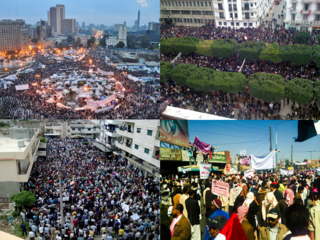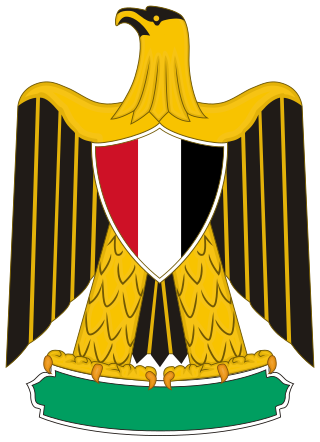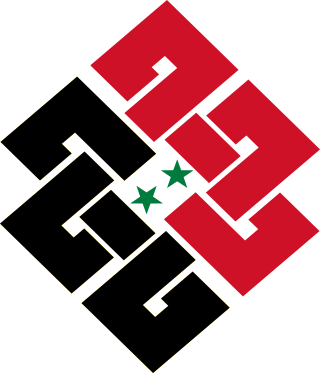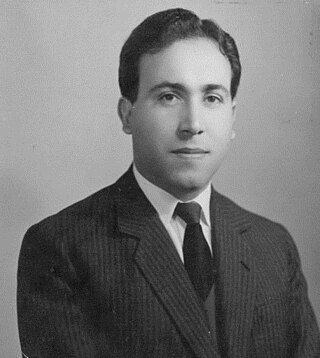Related Research Articles

The United Arab Republic, or simply the Arab Republic or Arabia, was a sovereign state in the Middle East from 1958 until 1971. It was initially a political union between Egypt and Syria from 1958 until Syria seceded from the union following the 1961 Syrian coup d'état. Egypt continued to be known officially as the United Arab Republic until 1971.

The Arab Socialist Baʿath Party was a political party founded in Syria by Mishel ʿAflaq, Ṣalāḥ al-Dīn al-Bītār, and associates of Zaki al-ʾArsūzī. The party espoused Baʿathism, which is an ideology mixing Arab nationalist, pan-Arabism, Arab socialist, and anti-imperialist interests. Baʿathism calls for unification of the Arab world into a single state. Its motto, "Unity, Liberty, Socialism", refers to Arab unity, and freedom from non-Arab control and interference.

Abd al-Karim Qasim Muhammad Bakr al-Fadhli al-Zubaidi was an Iraqi Army brigadier and nationalist who came to power when the Iraqi monarchy was overthrown during the 14 July Revolution. He ruled the country as the prime minister until his downfall and execution during the 1963 Ramadan Revolution.

The national flag of Egypt is a tricolour consisting of the three equal horizontal red, white, and black bands of the Egyptian revolutionary flag that dates back to the 1952 Egyptian Revolution. The flag bears Egypt's national emblem, the Egyptian eagle of Saladin, centred in the white band.

Zaki al-Arsuzi was a Syrian philosopher, philologist, sociologist, historian, and Arab nationalist. His ideas played a significant role in the development of Ba'athism and its political movement. He published several books during his lifetime, most notably The Genius of Arabic in its Tongue (1943).

The Third International Theory was the style of government proposed by Muammar Gaddafi in the early 1970s, on which his government, the Great Socialist People's Libyan Arab Jamahiriya, was officially based. It was partly inspired by Islamic socialism, African nationalism and partly by the principles of direct democracy.

Nasserism is an Arab nationalist and Arab socialist political ideology based on the thinking of Gamal Abdel Nasser, one of the two principal leaders of the Egyptian Revolution of 1952, and Egypt's second President. Spanning the domestic and international spheres, it combines elements of Arab socialism, republicanism, nationalism, anti-imperialism, developing world solidarity, Pan-Arabism, and international non-alignment.

The Constitution of Egypt has passed over a long period of evolution from the liberal constitution of 1923 to the contemporary constitution.

The Zanzibar Revolution occurred in January 1964 and led to the overthrow of the Sultan of Zanzibar and his mainly Arab government by the island's majority Black African population.
Third World socialism is a political philosophy and variant of socialism that has been proposed by Michel Aflaq, Salah al-Din al-Bitar, Zulfikar Ali Bhutto, Buddhadasa, Fidel Castro, Muammar Gaddafi, Saddam Hussein, Juan Domingo Perón, Modibo Keïta, Walter Lini, Gamal Abdel Nasser, Jawaharlal Nehru, Kwame Nkrumah, Julius Nyerere, Sukarno, Ahmed Sékou Touré and other socialist leaders of the Third World who saw socialism as the answer to a strong and developed nation.
The Arab Cold War was a period of political rivalry in the Arab world from the early 1950s to the late 1970s as part of the broader Cold War. The generally accepted beginning of the Arab Cold War was the Egyptian revolution of 1952, which ultimately led to Gamal Abdel Nasser becoming President of Egypt in 1956. Thereafter, newly established Arab republics defined by revolutionary secular nationalism, and largely drawing inspiration from Nasser's Egypt, were engaged in political rivalries of varying degrees of ferocity with conservative traditionalist Arab monarchies, led chiefly by Saudi Arabia. The approximate end point of this period of internecine rivalry and conflict is generally viewed as being the 1979 Iranian Revolution, which culminated in the installation of Ayatollah Ruhollah Khomeini as the leader of Iran's theocratic government. Thereafter, the bitterness of intra-Arab strife was eclipsed by a new era of Arab-Iranian tensions.

The Arab Spring was a series of anti-government protests, uprisings and armed rebellions that spread across much of the Arab world in the early 2010s. It began in Tunisia in response to corruption and economic stagnation. From Tunisia, the protests then spread to five other countries: Libya, Egypt, Yemen, Syria and Bahrain. Rulers were deposed or major uprisings and social violence occurred including riots, civil wars, or insurgencies. Sustained street demonstrations took place in Morocco, Iraq, Algeria, Lebanon, Jordan, Kuwait, Oman and Sudan. Minor protests took place in Djibouti, Mauritania, Palestine, Saudi Arabia and the Moroccan-occupied Western Sahara. A major slogan of the demonstrators in the Arab world is ash-shaʻb yurīd isqāṭ an-niẓām!.

The Arab Socialist Union was an Egyptian political party based on the principles of Nasserist Arab socialism.

The National Coordination Committee for Democratic Change (NCC), or National Coordination Body for Democratic Change (NCB), is a Syrian bloc chaired by Hassan Abdel Azim consisting of 13 left-wing political parties and "independent political and youth activists". It has been defined by Reuters as the internal opposition's main umbrella group. The NCC initially had several Kurdish political parties as members, but all except for the Democratic Union Party left in October 2011 to join the Kurdish National Council. Some opposition activists have accused the NCC of being a "front organization" for Bashar al-Assad's government and some of its members of being ex-government insiders.

Fuad al-Rikabi was an Iraqi politician and a founder of the Iraqi Regional Branch of the Arab Socialist Ba'ath Party. Al-Rikabi became the Secretary of Iraqi Regional Command of the Ba'ath Party in 1954 and held the post until 1959. Throughout his term of leadership, the Iraqi Regional Branch expanded its membership and became a leading party in Iraq's political landscape. Following the 14 July Revolution of 1958 which toppled the monarchy, al-Rikabi was appointed Minister of Development in Abd al-Karim Qasim's unity government.

The Syrian Social Nationalist Party in Lebanon (SSNP-L) is a Syrian nationalist party operating in Lebanon. The Lebanese section of the Syrian Social Nationalist Party advocates subsuming Lebanon into a Greater Syrian nation state spanning the Fertile Crescent.
The Arab Party for Justice and Equality is a political party that involves Arab tribes from the Sinai and Upper Egypt in the political process.

The Tunisian National Dialogue Quartet is a group of four civil society organizations that were central mediators in the effort to consolidate democratic gains and to form a lasting constitutional settlement in Tunisia following the unrest and historic regime change of the 2011 Jasmine Revolution.[1]
Freedom of religion in Tanzania refers to the extent to which people in Tanzania are freely able to practice their religious beliefs, taking into account both government policies and societal attitudes toward religious groups.
Fadlallah al-Haji is a Syrian rebel leader, close to Turkey and the Muslim Brotherhood. Considered a "scrupulous military man" by other Syrian rebel leaders and a "Turkish protégé", al-Haji has led the Sham Legion since its formation in 2014. He was appointed chief of staff of the Syrian Interim Government's General Staff of its Ministry of Defence in 2017, and has been the commander-in-chief of the National Front for Liberation since its formation in 2018. The NFL merged with the Syrian National Army in October 2019, and al-Haji was appointed a deputy chief of staff of the SNA, continuing to preside over the NFL, which will restructure into four legions.
References
- ↑ Egyptian Gazette (1960) 10 July cited in Middle East Record, Volume 1, 1960 Yitzhak Oron. The Moshe Dayan Center. p. 469-470 (Accessed July 2011)